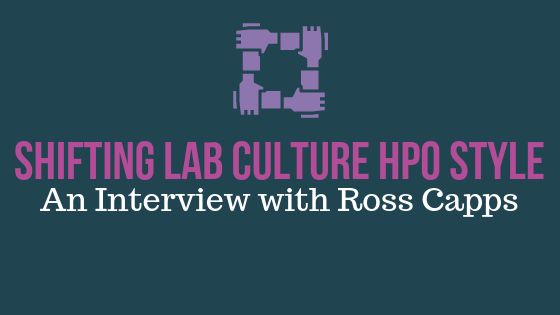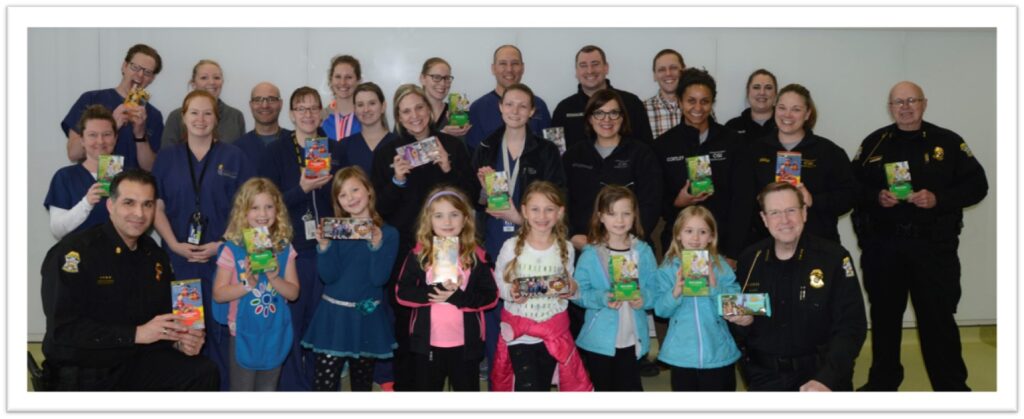Each year, Promega hosts workshops across the United States called Tech Tours, where speakers from various labs and organizations in the forensic community are brought in to discuss and share latest advancements in STR analysis and the forensics workflow.
Last year at the Tech Tours, Ross Capps, Lab Director at the Johnson County Sheriff’s Office Criminalistics Laboratory in Kansas City shared his vision for how to lead and engage his staff. His presentation resonated with many in the audience, and we’ve asked him to share his journey with you.
Ross, I’d first like to thank you for taking the time to talk with us. You’ve made some big changes in your lab since you were appointed Director in 2017, and I’m excited to be able to share them with our ISHI audience.
What do you feel differentiates you from past directors that you’ve worked with? Where does your inspiration to bring change come from?
I have worked in a paramilitary organization for the last twenty-three years. Our laboratory has always operated within the confines of a traditional hierarchical structure. Power and authority flow upward in a traditional hierarchy. Decisions are made at the top; information flows downward. General unhappiness and job dissatisfaction seem to be a common thread in traditional hierarchical systems.
I have always felt there had to be a better way of conducting business. I subscribe to the philosophy of servant leadership. I have committed to focusing on the people who get the job done. My role is to provide our team the time, tools, and resources needed to make us successful. I want there to be free-flowing information. Communication flow should be upward, downward, and sideways. The answers to our backlogs, productivity, etc. lie in the hearts and minds of the people doing the work.
My best friend of twenty years, Master Deputy Brandon Collins, was killed in the line of duty on 09/11/16. He made the ultimate sacrifice while serving our agency. Over the span of twenty years, we had many conversations about the possibility of positive change in our organization. The best way to honor him is to help create the work environment we both always wanted. I want his sacrifice to be at the heart of every positive change our agency makes.
I suspect many of our readers are unfamiliar with the acronym HPO. Could you define it for us, and tell us what it means to you and your lab?
HPO stands for High Performance Organization. A high performance organization is one that achieves results that exceed other organizations by incorporating strategies focusing on a sense of higher moral purpose.
Our culture must have a solid values-based foundation on which to build for a successful future. We need to motivate our employees by helping them connect their own values to the goals of the laboratory. Employees must understand the importance of their contributions. They must feel a sense of belonging to something bigger. They must have a clear understanding of ‘the big picture’.
When we are all seeing the same vision and traveling down the same path, we can begin to chip away at the backlogs, reduce turnaround times, work at peak efficiency, and give the best overall customer service experience possible.
How does HPO change the manager/employee relationship?
The spirit of HPO is development of a collaborative work environment. There is an expectation of open dialogue with everyone, regardless of rank. Ideas should be constantly flowing throughout the organization. HPO challenges us to work as a unified team to solve problems. Hierarchy still exists, but when we work on the functions of leadership to solve problems, we should function within a parallel organization.
Within the parameters of a parallel organization, the rules of the hierarchical structure are suspended. Leadership teams are formed. Everyone is equal on the team, so everyone is responsible for making the process work. In order to find the best solution possible for the organization as a whole, it is imperative for all team members to have a clear direction.
What steps did you take to begin to implement HPO in your lab?
I received HPO training at the University of Virginia in February, 2017. I shared the experience with our laboratory staff, which was somewhat unclear to them, given their lack of exposure and context. Our department brought in instructors from the University of Virginia to conduct training for all supervisors within the entire agency. We developed HPO topic-driven training sessions for the laboratory. As a group, we began to delve into who we are and what we want our laboratory to be. We defined our core values, developed a vision statement, and began to institute them throughout the fabric of our operations. We have always been focused on technical training, but we are now supporting additional personal/professional training to improve communication and leadership among all of our employees.
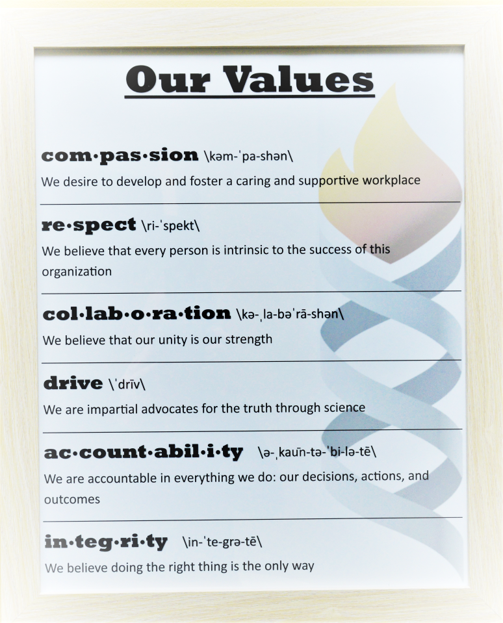
When did you start to notice a change in employee morale? What differences did you see?
A positive morale change was seen immediately. There was less of a feeling of anxiety and fear. There was an overall feeling of hope for the future. Those feelings could partially be attributed to a change in administration, which coincided with the institution of HPO. It was a move away from a very difficult period in the laboratory’s history.
If you consider Menninger’s morale curve, the morale at the beginning of anything (like a new job, new car ownership, etc.) is always at its highest. Morale dips once the dust settles and the honeymoon period ends. The important thing is to focus on moving the needle back up by focusing on the true intrinsic motivators for employees. The HPO honeymoon period is over in our laboratory; however, we are constantly working on optimal communication and ‘the big picture’.
You’ve placed a large emphasis on team building within your lab. Why is this?
Every successful relationship is built on the foundation of trust. In order for our laboratory to function as a cohesive unit we must establish trust. Team building allows relationships to grow. Getting to know your coworkers is indispensable to breaking down barriers. When the walls come down, you may find yourself having a better understanding of who people really are and why they act the way they do. You may find preconceived notions, assumptions, and perceptions about people to be erroneous. The camaraderie developed through team building is priceless to an organization. When one forges a trusting bond with another, it opens the door to possibilities that were nearly nonexistent before. I want my laboratory to be a single unified team all working for the common good. It’s all about the team and what’s best for ‘we’, not what’s best for ‘me’.
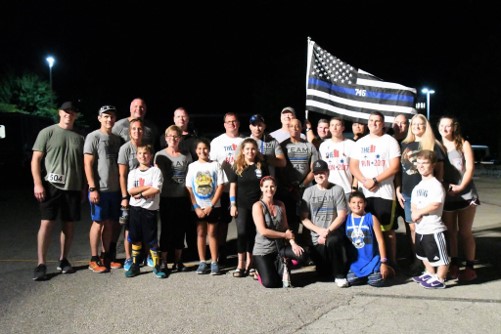
During your presentation, you mentioned extending the HPO philosophy outside of the lab to those in the community. How have you done this, and what impact has it had?
We are proud of our laboratory. We understand the vital role we play in the community. We just need to let everyone else know how important our work is. We work hard at developing a relationship with our community. We take every opportunity possible to share with our citizens exactly who we are and what we do. In turn, we gain their trust and support, which is vital to our success.
As a forensic laboratory we are in a unique situation where the public sees us as rock stars. Why wouldn’t we take advantage of that positive public perception to do good things? If we don’t use our positions for good, then what good are we? We are public servants. I believe we should give, give, and give some more. When we’ve given all we think we can, we need to find a way to give some more.
Our laboratory does a tremendous amount of community outreach. Aside from sharing on a work-related level, I’m very proud of our community involvement simply as fellow human beings. Our laboratory runs Friday Bingo at the nursing home across the street from our laboratory, we participate in Meals on Wheels, and volunteer gardening skills in the county WIC garden. These are opportunities for us to give back while simultaneously team building with altruism as the driver.
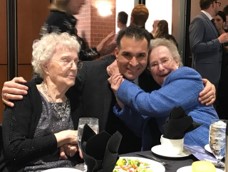
You also discussed bringing in those who are able to make a difference. Would you be able to elaborate on who you brought in, why, and the result?
In forensic science, we don’t usually see the fruits of our labor. We work from one case to the next. The cases keep piling up and the work becomes a source of frustration in its volume and scope. I don’t ever want our work to be thought of as just a job. I want our work to be understood as a calling. Every piece of evidence should be handled with the knowledge that human beings were adversely affected by the act(s) that necessitated that evidence reach our hands. I want our employees to understand the vital importance of the work they do.
I requested some individuals who had been affected by our work to visit our laboratory and speak to our staff. I wanted our guests’ feedback to be a clear demonstration of our purpose. A homicide victim’s father spoke at one of our laboratory staff meetings. This gentleman was able to express the profound effect our work had on him and his family. It was our work that brought about justice and some closure to a family who will never be able to get their loved one back. A close family friend of another homicide victim also spoke to our laboratory. He detailed his experience from first hearing about the incident through the trials of the defendants. His praise could do nothing less than motivate each employee to strive to always be the best; to put every bit of effort into every piece of evidence worked.
Looking back on your lab’s journey with HPO, is there anything that you would have done differently?
If I had to start again, I would ensure everyone received the same HPO training up front. The jargon, the cues, and the concepts may be too foreign to completely grasp unless you’ve had ample exposure. We are still trying to get all of our employees through some semblance of formalized HPO training. It’s difficult to institute culture change in an environment that has existed in despondency for so many years. That uphill battle is exacerbated when you don’t have everyone on board, not because they don’t want to be, but because they don’t fully grasp the ‘what’, ‘how’, and ‘why’.
For those who would like to implement similar changes in their lab, do you have any words of advice on how others in leadership roles could get started? What about those who are not in leadership roles?
Be patient! As an impatient person, I will iterate and reiterate – be patient! It’s been said HPO takes seven years to fully implement. We develop unconscious habits that are sometimes negative and counterproductive. Once we get into a negative rut, it becomes all-consuming and a way of life. It’s all about developing enough self-awareness to understand who you are and what you bring to the team.
Are your contributions positive and nurturing, or are they negative and destructive? Negativity tends to spread like a disease. Imagine year upon year of a culture steeped in negativity and pessimism. That simply cannot be changed overnight.
I suggest training, training, and more training in the areas of leadership and communication. Put the training into action immediately, lest we forget. Education and understanding is imperative to breaking the cycle. This applies to everyone because we are all responsible for leadership at all levels.
For those in higher ‘ranks’, remember you are under the microscope and everyone is looking to you to set the tone. Be the one to take the hardest look at yourself. It’s not always a pleasant view; trust me I know from experience. What you did yesterday doesn’t need to be repeated today. You cannot change anyone except yourself. Changing ourselves is a choice. Be the change you want to see in your organization. Be vulnerable. Build the trust. Be patient!
Do you have any additional plans in store for the lab in the future?
Our journey is just beginning. We will always be looking for opportunities to improve ourselves and our operations. We are fully committed to learning and growing. The plan is to always be willing to change and open the door to possibilities.
WOULD YOU LIKE TO SEE MORE ARTICLES LIKE THIS? SUBSCRIBE TO THE ISHI BLOG BELOW!
SUBSCRIBE NOW!

